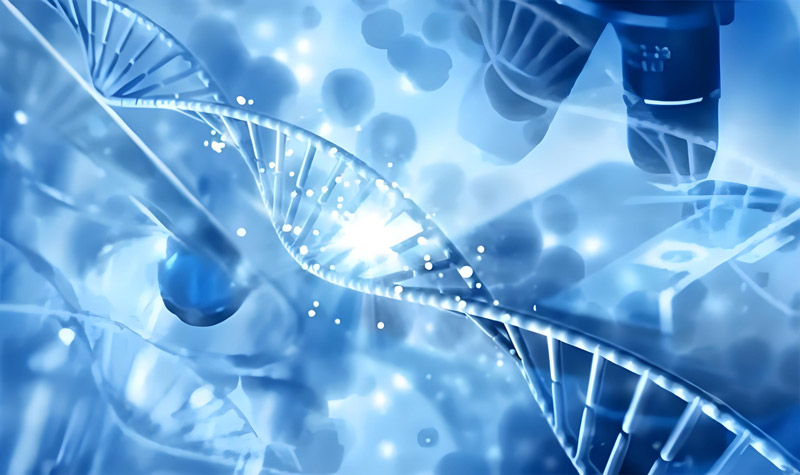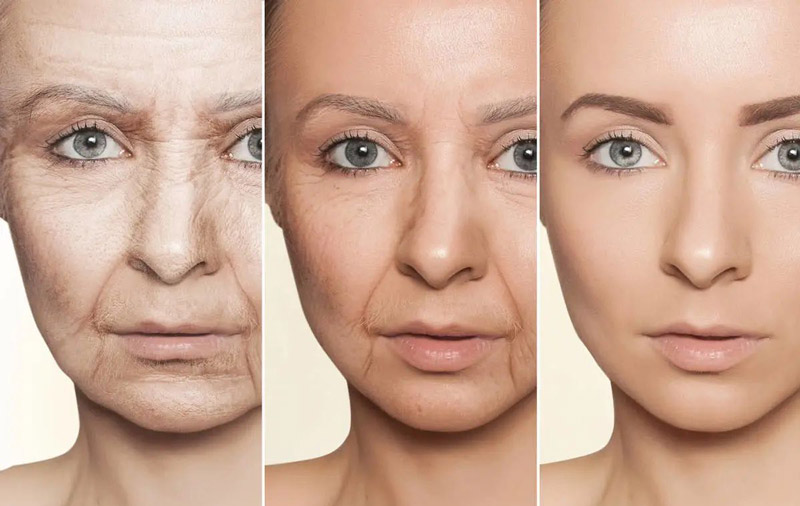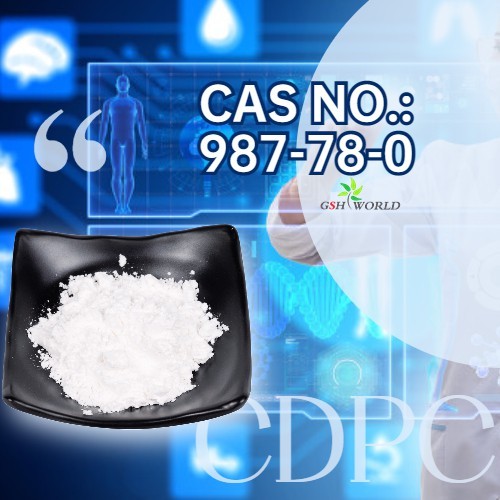Glutathione (GSH) is found in the cells of all living organisms on Earth and is essential to our life.
A billion years ago, life began to appear on the Earth, and there are substances in the gas of the ecological environment that are toxic to life.
The atmosphere is made up of hydrogen, carbon monoxide, ammonia, and methane, and to protect themselves from destruction, these acid cells must incorporate antioxidants into the cytoplasm.
The chief antioxidant, as far as we can tell, is the ubiquitous glutathione.
First of all, glutathione helps prevent the toxic effects of REDOX in plants, and apparently early single-celled plants began using glutathione as an antioxidant to prevent destruction during oxidation.
Much later, animal cells also incorporated the compound glutathione to help them control the waste products produced by oxidation.
Glutathione still plays a protective role in all cells today, and is the main antioxidant in cells, at any time, the Earth is full of sulfur and carbon-containing gases; It also AIDS in the detoxification of various carbon compounds.
The pollution of our environment will reproduce through the chemical properties of glutathione and cysteine similar to primitive times, protecting us from the possibility of extinction.
Glutathione in our bodies
Glutathione is a compound synthesized from cysteine that is present in almost all living cells.
It is found in higher concentrations in animals than in plants, and since humans need glutathione more, it may be found in higher concentrations in humans than in other animals.
The amount present in the body varies with the organs and tissues.
The content of glutathione was the highest in liver, kidney and pancreas.
Take clear and cornea, also rich in glutathione.
With age, the amount of glutathione in the body decreases. According to a summary of research by Hazelton and Lang, a steady decline in glutathione in tissues is a general feature of aging.
In experimental studies on rats, it was found that the amount of glutathione present in the tissue cells of each organ was lost as the rats aged.
For example, a 31-month-old rat (equivalent to a human about 70 years old) was found to have 20 to 35 percent less glutathione in the heart, liver, and kidneys than a younger rat.
Extensive studies of rats have found that glutathione is also present in large quantities in the gastric mucosa.
Glutathione levels in the stomach sometimes exceed those in the liver, but this depends on the sampling time.
Stomach glutathione levels are highest in the morning and lowest in the evening.
This could be a high concentration of glutathione, which protects the lining of the stomach when hydrochloric acid is highly oxidized, as stomach acid levels are highest from the morning onwards.
Functions of glutathione:
Glutathione has four main roles in the body.
1, it protects the body from powerful natural and man-made oxidation;
2, help the liver to detoxify toxic chemicals;
3, promote the growth of red blood cells, improve immune function, which is also its vital role;
4. Finally, glutathione also acts as a neurotransmitter
Glutathione is an anti-aging agent
Glutathione, like cysteine, contains key sulfhydryl groups (thiols), making it a potent antioxidant.
Toxic chemicals, both natural and man-made, can cause damage in the body by oxidizing fat.
This dangerous process is called peroxidation.
Lipid peroxidation destroys the human cell membrane, seriously damages the function and structure of the cell membrane, affects the fluidity of the cell membrane and even destroys the chromosome structure.
Many industrial chemicals form peroxides, such as carbon tetrachloride, benzene, plastics, dyes, herbicides, and pesticides.
They affect the metabolism of the liver, and such peroxides can cause fatty liver disease, cirrhosis and even liver cancer.
However, the enzyme complex form of glutathione or cysteine is called glutathione peroxidase, and its purpose is to reduce peroxide.
This antioxidant system of glutathione peroxidase, which includes glutathione peroxidase and glutathione reductase, both derived from glutathione, the function of this enzyme system is to clear lipid peroxides and prevent the production of other free radicals, glutathione peroxidase provides a free electron conversion of hydrogen peroxide conversion, constantly working.
The second complex enzyme is glutathione in the liver, the glutathione S-transferase
(Glutathione-s-transterases), where glutathione helps convert many heterogeneous compounds into less toxic substances that are then excreted through the liver, bile, and colon.
Many of the other functions of glutathione, glutathione-S-transferase, and liver enzymes are still under investigation, but in one study all of these inhibitors of chemical carcinogenesis were found to increase glutathione-S-transferase activity in the liver and small intestine of rats.
Glutathione is an indispensable nutrient, when glutathione makes the enzyme deficiency, it will affect the survival of the body, glutathione it is also one of the many metabolites, more specifically, the lack of cysteine will affect the amount of glutathione produced, so cysteine should be very important, when the body is in a toxic environment and state, The key is to have enough hemionine and glutathione in your diet.
Glutathione is associated with enhanced immunity
Glutathione is thought to help transport L-alanine and L-threonine across cell membranes for the production of white blood cells, which are essential for lymphocytes.
As mentioned earlier, humans have a higher need for glutathione than other animals because human lymphocytes contain more than three times more glutathione than rat lymphocytes.
The immune system relies on glutathione.
Supplementation of glutathione in normal human serum protein increased the ability of macrophages to destroy bacteria invading cell membranes.
Glutathione also has higher levels in the thymus because the thymus plays an important role in the immune system.
The ability of macrophages to remove foreign bacteria in time to protect tissues and organs.
When glutathione is depleted, it affects the production of macrophages and therefore loses the ability to protect tissues and organs such as the spleen, lungs and liver.
When glutathione is low, macrophage production is inhibited by prostaglandins, leukotrienes C (Note 3).
Leukotriene C in the immune system, can prevent the invasion of foreign microorganisms on the cell, which is another immune system importance.
Using a glutathione metabolic inhibitor, the researchers found that the glutathione precursor combined with arachidonic acid (an essential unsaturated fatty acid) to form at least one prostaglandin E-2, which is involved in fighting inflammation and immunity.
Glutathione is responsible for the transport of oxygen
Glutathione is involved in the production of red blood cells, which contain hemoglobin and carry oxygen and carbon dioxide throughout the body, but the mechanism is unclear.
In numerous studies, it has been shown that when women take birth control pills, their red blood cells produce extra glutathione peroxidase.
This may be due to oral contraceptives raising blood lipids, which the body does to prevent dangerous peroxidation of red blood cells.
A drug that inhibits cysteine metabolism and converts glutathione to S-methylcysteine.
S-methylcysteine has adverse effects on red blood cells.
Tucker found that the inhibitor caused severe anemia, weakened red blood cells and reduced their lifespan.
This also demonstrates the important role of glutathione in red blood cells.
In animal experiments on rats, it was found that the absorption of glutglycin by mammary tissue during lactation, and the high level of gluthyoglycin in red blood cells, will increase milk production.
After pregnancy, glutathione (or other groups) may be a cofactor that stimulates thyroid activation while making milk production increase.
More research is needed to verify whether the prolactin effect of gluthyoglycotide can be applied to humans to solve the problem of breast milk treatment in lactating women.
Glutathione is a neurotransmitter, and glutathione, like cysteine, has been recognized as a neurotransmitter.
But the exact role in the brain is still poorly understood.
Deficiencies of cysteine and glutathione are sometimes found in psychopaths, and the importance of cysteine and glutathione in normal mental function is unclear.
metabolism of glutathione
Glutathione is a small tripeptide protein composed of three amino acids: cysteine, glutamic acid and glycine.
Before it can enter the cell membrane, it needs to reduce its composition, and when it enters the cell, it can be reused again.
Glutathione is dependent on vitamin B6, vitamin B2 and folate for conversion.
Vitamin E is another important antioxidant, it is also involved in glutathione metabolism, the lack of cone E in rats, reduce the activity of glutathione peroxidase, its role is to protect cells from oxidative free radical damage and protect the peroxidase.
In our clinic, when patients are supplemented with cysteine and glutathione, we almost always supplement with the mineral selenium to increase glutathione peroxidase activity.
A lack of the mineral zinc can also lead to a decrease in blood glutathione, and the minerals magnesium, zinc, and vanadium may also enhance glutathione synthesis under certain conditions.
Glutathione (GSH) helps the body to clear man-made poisons, and glutathione helps to alleviate the man-made toxins we live with every day from a wide range of chemical pollution.
Glutathione helps the liver clear these chemicals and cleanse our bodies;
And even more importantly to clean up the environment itself, glutathione should be put into polluted lakes and chemical disaster zones, changing our living conditions, and perhaps glutathione will become the guide for life on Earth to return to the original cell proliferation process.
Food source of glutathione
Adequate glutathione levels in the body depend on sufficient, available cysteine, glycine, and glutamate.
only cysteine seems to be in short supply.
Glycine and glutamate are very abundant in the diet, and they may never be a cause of glutathione deficiency.
Cysteine needs to be converted from methionine.
When methionine and cysteine are lacking, glutathione levels are also reduced.
As long as the diet contains adequate levels of methionine and cysteine, glutathione may be sufficient.
The exception is infants, whose bodies are not yet able to convert methionine to cysteine, so their cysteine needs to be supplied from breast milk.
Clinical application of glutathione
In most cases, the clinical use of glutathione is achieved by supplementation with n-acetylcysteine, which is converted in the body to increase glutathione levels.
Glutathione is a small tripeptide protein that is used in stressful situations, such as illness, intense exercise, or excessive fatigue, by supplementing with glutathione to increase the level and ability to hold it in the blood.
Using oral or intravenous acetylcysteine is the best way to increase glutathione levels.
Glutathione and alcoholism
The high concentration of glutathione in liver cells, in addition to preventing fatty liver induced by thioamide drugs and chemicals such as carbon tetrachloride and cleaning agents;
Glutathione may also help prevent or even reverse fatty liver disease, cirrhosis, hepatitis, and liver tumors caused by alcoholism.
Glutathione and cancer
It is now widely believed that glutathione and other antioxidants inhibit chemical-induced cancer, but some antioxidants are only due to prevention before cancer.
What we found surprisingly in one study was that rats given a very high dose of the carcinogen aflatoxin B1 developed liver tumors in every rat within a year, and then rats with liver tumors given 100 milligrams of glutathione per day intravenously for 4 to 16 months found that 81 percent of the rats had liver tumors either gone or were present. But they're still alive.
Glutathione and cataracts
Glutathione has a high concentration in the cornea and lens of the eye, and it helps to keep the lens clear, protect vision, and prevent cataracts.
Vitamin B2 deficiency is a factor in cataract formation, but vitamin B2 must depend on glutathione reductase to exist, and reduced production of glutathione reductase causes vitamin B2 deficiency, which is the cause of disease in 25% of cataract patients.
Therefore, supplement N-acetylcysteine to prevent the deficiency of vitamin B2, and fill some element selenium every day to avoid the risk of cataracts
People with galactosemia genetic disease, galactose in the body can not be metabolized properly and accumulate in the body, especially prone to cataract.
Induced with large amounts of galactose, experimental animals can develop cataracts.
At this time, it was found that the animals' glutathione was insufficient, and when the animals' glutathione was increased, the cataract was improved.
In animal studies, X-ray or naphthalene induction (mothballs) has been found to induce cataracts, while also showing reduced glutathione levels in the lens.
Supplementation with glutathione or n-acetylcysteine may avoid the formation of cataracts in some cases.
Glutathione and drug overdose
Acetyl cysteine, combined with activated carbon and magnesium citrate, is often used in hospitals to administer high doses of angel dust or Phencyclidine (PCP), a narcotic and psychedelic, or other substance abusers. Detoxify and prevent damage to the liver.
The above "angel dust" and PCP are very dangerous hallucinogens that can cause neuropathic hallucinations and permanent brain damage.
In laboratory animal tests of high doses of PCP, 80% of the animals died and only 20% survived treatment with n-acetylcysteine.
Raising n-acetylcysteine and glutathione prevents these hormones from entering the liver. N-acetylcysteine is converted to cysteine to synthesize glutathione, which then helps detoxify tissues and organs.
Studies have also found that people who take too much Acetaminophen can take up to 5 to 10 grams of n-acetylcysteine every four hours to avoid toxic damage to the liver.
Glutathione and mood disorders
In recent decades, it has been of great concern to many scholars that glutathione is a neurotransmitter, and blood glutathione levels are reduced in response to temporary mood and mood disorders. altschul reviewed these studies and found that in people with depression and manic schizophrenia, They all had low levels of glutathione in their blood, and he suggested that a regimen of electric shock or pineal extract supplementation (described in section 4 of the psychotropic drug "hydrochloric acid, sleep enhancer") could increase blood glutathione levels.
In our clinic, all patients suffering from depression or manic schizophrenia are given a supplement of acetylcysteine to reduce the side effects of psychotropic drugs and to help stabilize the brain and mood.
Glutathione responds to environmental pollution
Glutathione can protect the liver and lungs from the effects of automobile exhaust pollution, but the increase in glutathione production is also different due to different individuals' liver and lungs in the case of pollution.
Chaudhari and Duta said that lung cells under the influence of exhaust gas, many enzymes in the body are abnormal, such as angiotensin-converting enzyme is increased, resulting in increased blood pressure.
Especially in the commuting time, crowded roads, traffic walking slowly, these toxic pollutants are more serious, in order to prevent these unusually high density of toxic substances on the lungs and liver damage, the most sensible way is to supplement 500 mg of cysteine every morning and evening, which can provide the body to produce glutathione raw materials.
Cigarette smokers should supplement at least 500 mg of cysteine per day to protect the lungs from loss.
Glutathione and heavy metal toxicity
Glutathione is the most important drug used clinically to detoxify the body.
Compared with other chemical detoxification substances, glutathione is not toxic, and it can also prevent excessive heavy metal damage to the body.
In the case of lead toxicity, large amounts of glutathione are produced in the body in response to lead poisoning.
Excess lead reduces the storage of glutathione in the liver by 28%, and glutathione supplementation can treat lead poisoning. Glutathione forms a chelate with lead and cadmium, allowing it to be excreted from the blood.
Glutathione can also treat the toxicity of mercury.
From 2 to 4 weeks after birth, the body is able to excrete mercury through bile, which is closely related to the increased ability of the liver to secrete glutathione.
The deficiency of glutathione in the body is also often related to genetics.
Mercury poisoning can cause hair loss, heart and mental illness.
Minamata disease is an environmental form of mercury poisoning that cannot be removed from the body without sufficient glutathione.
Glutathione can reduce the heavy metal arsenic poisoning.
In animal experiments, they were fed arsenic-contaminated milk for 40 days, then supplemented with a dose of 100 mg/kg of glutathione, and within 10 days their blood levels returned to normal.
Fever caused by arsenic poisoning also subsided within 20 days, and symptoms of anemia and decreased white blood cells also improved.
Pigment on the skin was also reduced, and other clinical signs of arsenic poisoning improved.
Glutathione can also replace dimercaprol (a thiol drug) in the treatment of arsenic poisoning.
Glutathione and oxygen poisoning
Glutathione acts as an antioxidant in hyperbaric oxygen therapy.
Hyperbaric oxygen is a treatment used for stroke patients, but it carries a risk of damaging the lungs and other delicate tissues, and depends on a number of factors, such as age, nutrition and endocrine status.
In animal experiments, when oxygen pressure was applied to the rats at 1.5 atmospheric pressure, the rats produced mild oxygen poisoning.
When the oxygen pressure was increased to six atmospheres, the oxygen caused extensive damage to the organs of the rats, and then the rats were provided with supplementary glutathione to achieve good reduction protection.
Glutathione and Parkinson's disease
The antioxidants glutathione and acetylcysteine have shown great potential in protecting the brain and people with Parkinson's disease.
There is some anecdotal evidence that intravenous administration of glutathione or n-acetylcysteine has been very effective in treating Parkinson's disease. (instead of oral glutathione and n-acetylcysteine).
Glutathione and radiation protection
Glutathione and several sulfhydryl compounds (compounds containing sulfur and hydrogen) protect cells from ionization, which act as a reducing agent for detoxification and can release a hydrogen atom from itself, which combines with free radicals to become water.
Kuna et al. found that glutathione has a valuable application in treating radiation damage after a nuclear accident. In animal studies, supplementation with glutathione at a dose of 400 mg/kg after X-ray injury of 2 MeV can increase the number of white blood cells, restore weight and reduce the chance of death.
Sulfur amino acids, or cysteine, are the most powerful natural radiation protection compounds.
Glutathione or cysteine should be supplemented before cancer radiation therapy.
Glutathione and stroke damage
It has been shown that levels of glutathione can predict brain stroke.
Fritz et al. have shown that the levels of glutathione in the cerebrospinal fluid of stroke patients are lower than before the stroke.
In the future, glutathione and cysteine will be included in emergency medicine in hospitals, or used in daily life like sugar and salt to avoid low levels of glutathione, which can lead to stroke and other diseases.
Glutathione and canker disease
There have been many cases where glutathione has been shown to protect mucous membranes from damage caused by stomach acid.
In animal experiments, Boyd et al. gave rats cold, starvation, restraint, and ulceration-causing chemicals in feeding, etc., under various stresses, rats developed ulcers and glutathione levels in the stomach decreased.
At the same time, drugs such as Aspirin, Phenylbutazone and other similar NSaids have been found to cause ulcers and decrease glutathione levels in the body.
At this time, the experimental rats were given control of butazone or Piroxican (aspirin), while glutathione or cysteine was injected into the abdomen of the rats to increase the level of glutathione in the rats and prevent gastric cancer lesions.
There is a very similar chemical structure to cysteine - hemidiamine (also known as mercaptoethylamine, Cysteamine), which actually stimulates ulcer formation.
However, unlike cysteine, cysteinic acid can cause histamine release and increase the secretion of gastric juice;
There is also an increase in hemolytic lecithin in the gastric juices, which, like lecithin, can prevent cysteine-induced stomach ulcers.







